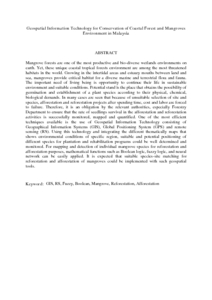Citation
Jusoff, Kamaruzaman
(2008)
Geospatial Information Technology for Conservation of Coastal Forest and Mangroves Environment in Malaysia.
Computer and Information Science, 1 (2).
pp. 129-134.
ISSN 1913-8989
Abstract
Mangrove forests are one of the most productive and bio-diverse wetlands environments on earth. Yet, these unique coastal tropical forests environment are among the most threatened habitats in the world. Growing in the intertidal areas and estuary mouths between land and sea, mangroves provide critical habitat for a diverse marine and terrestrial flora and fauna. The important need of living being is opportunity to continue their life in sustainable environment and suitable conditions. Potential stand is the place that obtains the possibility of germination and establishment of a plant species according to their physical, chemical, biological demands. In many cases are seen that because of unsuitable selection of site and species, afforestation and reforestation projects after spending time, cost and labor are forced to failure. Therefore, it is an obligation by the relevant authorities, especially Forestry Department to ensure that the rate of seedlings survival in the afforestation and reforestation activities is successfully monitored, mapped and quantified. One of the most efficient techniques available is the use of Geospatial Information Technology consisting of Geographical Information Systems (GIS), Global Positioning System (GPS) and remote sensing (RS). Using this technology and integrating the different thematically maps that shows environmental conditions of specific region, suitable and potential positioning of different species for plantation and rehabilitation programs could be well determined and monitored. For mapping and detection of individual mangrove species for reforestation and afforestation purposes, mathematical functions such as Boolean logic, fuzzy logic, and neural network can be easily applied. It is expected that suitable species-site matching for reforestation and afforestation of mangroves could be implemented with such geospatial tools.
Download File
![[img]](http://psasir.upm.edu.my/7531/1.hassmallThumbnailVersion/Geospatial%20Information%20Technology%20for%20Conservation%20of%20Coastal%20Forest%20and%20Mangroves%20Environment%20in%20Malaysia.pdf)  Preview |
|
PDF (Abstract)
Geospatial Information Technology for Conservation of Coastal Forest and Mangroves Environment in Malaysia.pdf
Download (85kB)
| Preview
|
|
Additional Metadata
Actions (login required)
 |
View Item |

